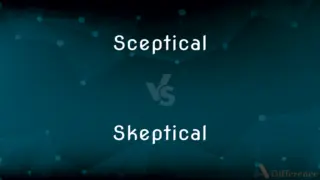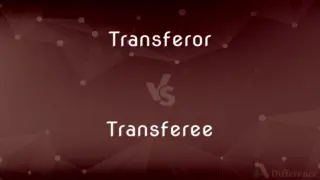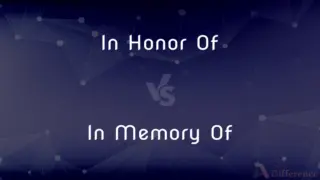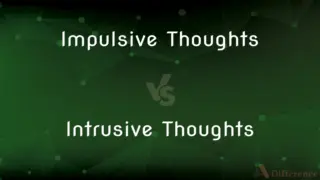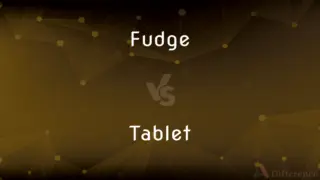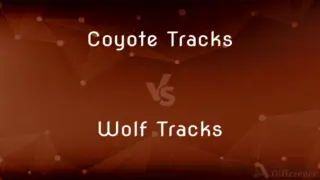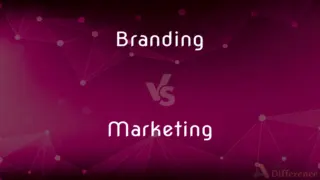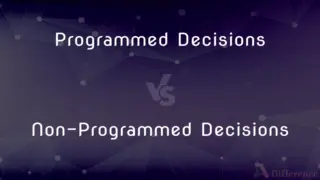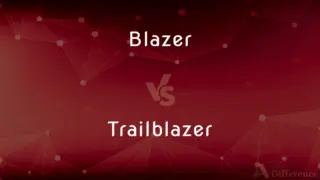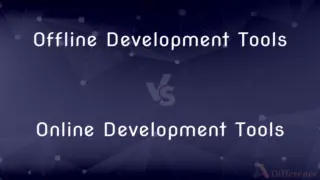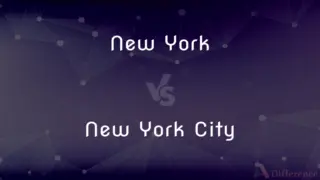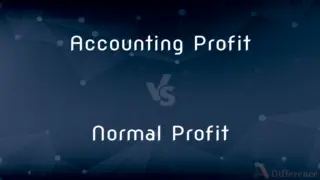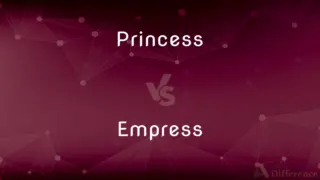Internet vs. Books — What's the Difference?
By Tayyaba Rehman & Maham Liaqat — Updated on May 16, 2024
The internet offers instant access to vast, up-to-date information, whereas books provide in-depth, curated knowledge with physical engagement. Both have unique roles in learning and information consumption.

Difference Between Internet and Books
Table of Contents
ADVERTISEMENT
Key Differences
The internet is a digital network providing quick access to a wide range of information and multimedia content. It's highly dynamic, constantly updated, and interactive, allowing users to find the latest information on virtually any topic. In contrast, books offer in-depth, carefully curated information that has been traditionally peer-reviewed or edited. They provide a tangible reading experience and are often considered more reliable for detailed research.
The internet facilitates real-time communication and collaboration through various platforms such as social media, forums, and email. This immediacy allows for quick exchange of ideas and information. Books, on the other hand, encourage a more reflective and focused approach to reading. They allow readers to absorb information at their own pace without the distractions commonly found online.
With the internet, users can access a vast array of resources, including articles, videos, and interactive content, often for free or at a low cost. This democratizes information, making it accessible to a broader audience. Books, however, often require a purchase or library access, and their physical nature means they must be stored and maintained, which can be less convenient but also provides a sense of ownership and permanence.
While the internet's vastness and immediacy can sometimes lead to information overload and challenges in verifying sources, books offer a more structured and reliable form of information. Each book is typically focused on a specific subject, providing thorough coverage and a more immersive learning experience.
Comparison Chart
Accessibility
Instant, global, and digital
Physical, limited to availability
ADVERTISEMENT
Information Update
Constantly updated and real-time
Static once published
Content Format
Multimedia (text, video, audio)
Text and images only
Cost
Often free or subscription-based
Purchase or library access needed
Reliability
Variable, depends on source
Generally high due to curation
Compare with Definitions
Internet
An interactive medium for social interaction and content sharing.
Social media sites on the internet enable users to share their daily lives.
Books
Physical or digital volumes of written or printed works.
She enjoys reading mystery books before bed.
Internet
A tool for e-commerce and online shopping.
Many businesses sell their products directly on the internet.
Books
A medium for recording and disseminating knowledge and stories.
History books provide detailed accounts of past events.
Internet
A global digital network connecting millions of computers.
The internet allows people to communicate instantly across the globe.
Books
A curated source of information on a specific topic.
Textbooks are essential for structured learning in schools.
Internet
A platform for accessing a vast array of information and services.
Students use the internet for research and online classes.
Books
An object for personal enjoyment and leisure reading.
Novels are popular books for vacation reading.
Internet
A resource for streaming multimedia content.
You can watch movies and listen to music on the internet.
Books
A reference material for in-depth study and research.
Researchers rely on academic books for comprehensive information.
Internet
The Internet (or internet) is the global system of interconnected computer networks that uses the Internet protocol suite (TCP/IP) to communicate between networks and devices. It is a network of networks that consists of private, public, academic, business, and government networks of local to global scope, linked by a broad array of electronic, wireless, and optical networking technologies.
Books
A set of written, printed, or blank pages fastened along one side and encased between protective covers.
Internet
A publicly accessible system of networks that connects computers around the world via the TCP/IP protocol.
Books
An e-book or other electronic resource structured like a book.
Internet
Alternative case form of Internet
Books
A printed or written literary work
Did you ever finish writing that book?.
Internet
(uncountable) Internet access or connection; internet connectivity.
Do you have internet at your place? My internet is down and I want to check my email.
Hello everyone, this is your daily dose of internet.
Books
A main division of a larger printed or written work
A book of the Old Testament.
Internet
(countable)
Books
A volume in which financial or business transactions are recorded.
Internet
Any set of computer networks that communicate using the Internet Protocol; an intranet.
Books
Books Financial or business records considered as a group
Checked the expenditures on the books.
Internet
A fictitious unit of scoring awarded for making outstanding posts on the internet.
Books
A libretto.
Internet
To use the Internet; specifically, to search for information using the Internet.
Having no idea what that means, I am internetting like mad.
Books
The script of a play.
Internet
To entwine or link (several things) together, so as to form a network; to interconnect, to network.
Books
The Bible.
Internet
To connect (a computer, an electronic device, etc.) into a computer network (in particular, the Internet).
Books
The Koran.
Internet
A large network{3} of numerous computers connected through a number of major nodes of high-speed computers having high-speed communications channels between the major nodes, and numerous minor nodes allowing electronic communication among millions of computers around the world; - usually referred to as the internet. It is the basis for the World-Wide Web.
Books
A set of prescribed standards or rules on which decisions are based
Runs the company by the book.
Internet
A computer network consisting of a worldwide network of computer networks that use the TCP/IP network protocols to facilitate data transmission and exchange
Books
Something regarded as a source of knowledge or understanding.
Books
The total amount of experience, knowledge, understanding, and skill that can be used in solving a problem or performing a task
We used every trick in the book to finish the project on schedule.
Books
(Informal) Factual information, especially of a private nature
What's the book on him?.
Books
A pack of like or similar items bound together
A book of matches.
Books
A record of bets placed on a race.
Books
(Games) The number of card tricks needed before any tricks can have scoring value, as the first six tricks taken by the declaring side in bridge.
Books
To arrange for or purchase (tickets or lodgings, for example) in advance; reserve.
Books
To arrange a reservation, as for a hotel room, for (someone)
Book me into the best hotel in town.
Books
To hire or engage
Booked a band for Saturday night.
Books
To list or register in a book
Booked the revenue from last month's sales.
Books
To list or record appointments or engagements in
A calendar that was booked solid on Tuesday.
Books
To record information about (a suspected offender) after arrest in preparation for arraignment, usually including a criminal history search, fingerprinting, and photographing.
Books
(Sports) To record the flagrant fouls of (a player) for possible disciplinary action, as in soccer.
Books
To designate a time for; schedule
Let's book a meeting for next month.
Books
To be hired for or engaged in
The actor has booked his next movie with that director.
Books
To make a reservation
Book early if you want good seats.
Books
Of or relating to knowledge learned from books rather than actual experience
Has book smarts but not street smarts.
Books
Appearing in a company's financial records
Book profits.
Books
Plural of book
Books
(accounting) Accounting records.
Common Curiosities
Which is more cost-effective, the internet or books?
The internet is often more cost-effective, offering a wealth of information for free or low cost.
Are books still relevant in the digital age?
Yes, books are valued for their in-depth coverage and reliability.
Can the internet replace books?
The internet complements books but cannot entirely replace the in-depth and curated nature of books.
What is the primary difference between the internet and books?
The internet offers instant, up-to-date information, while books provide curated, in-depth knowledge.
How does the internet update information?
The internet updates information in real-time, allowing for constant revision and addition.
Can you access books on the internet?
Yes, many books are available in digital format on the internet.
How do books and the internet support learning?
Books support deep, focused learning, while the internet offers quick, broad access to diverse resources.
How does information overload on the internet compare to books?
The internet can lead to information overload due to its vast and varied content, whereas books provide focused information.
Is the internet more interactive than books?
Yes, the internet supports interactive content and real-time communication, unlike static books.
What are the advantages of books over the internet?
Books offer a more immersive reading experience and reliable, curated information.
What are the advantages of the internet over books?
The internet provides instant access to a wide range of up-to-date information and interactive content.
Do books require a physical space for storage?
Yes, books require physical space for storage, unlike digital content on the internet.
How reliable is information on the internet compared to books?
Information on the internet varies in reliability, while books are typically more reliable due to editorial processes.
Share Your Discovery

Previous Comparison
Comma vs. Semicolon
Next Comparison
Caution vs. WarningAuthor Spotlight
Written by
Tayyaba RehmanTayyaba Rehman is a distinguished writer, currently serving as a primary contributor to askdifference.com. As a researcher in semantics and etymology, Tayyaba's passion for the complexity of languages and their distinctions has found a perfect home on the platform. Tayyaba delves into the intricacies of language, distinguishing between commonly confused words and phrases, thereby providing clarity for readers worldwide.
Co-written by
Maham Liaqat

